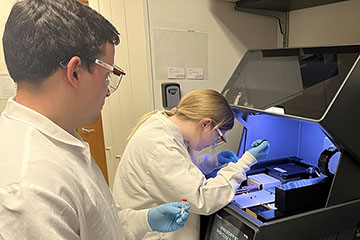CMU's rural health equity leader to serve on MDHHS committees
Alison Arnold, Ed.D. proud to join in shaping statewide Social Determinants of Health Strategy
The Michigan Department of Health and Human Services is implementing a statewide Social Determinants of Health Strategy, as part of Michigan’s Roadmap to Healthy Communities (2022-2024); and is collaborating with community members and local organizations to co-design SDOH Hubs that bring together local expertise to support community-determined priorities for health and well-being.
Alison Arnold, Ed.D., executive director of the CMU Rural Health Equity Institute has been appointed to serve on two special committees that will support the innovation phase of the MDHHS SDOH Strategy and will work together with regional SDOH hubs in rural communities. Under Arnold’s leadership, the CMU Rural Health Equity Institute teams with rural communities to improve access to services, expand telehealth capacity and deliver education in response to local needs. Representing CMU, as a collaborator with MDHHS, Alison will bring expertise, deep community connections, and a voice for unique challenges and opportunities of rural communities.
Arnold has been appointed to serve on the statewide Social Determinants of Health Advisory Council and the Community Information Exchange Advisory Committee. The SDOH Advisory Committee will guide the implementation of the SDOH Hub pilot program and will develop recommendations regarding the focus of their work. Ultimately, the SDOH hubs will bring together community members, health and social care professionals working to address the many non-medical factors influencing health outcomes like access to food, housing, transportation, and other social drivers of wellness. The SDOH hubs will provide a shared mission and encourage local partners to work together toward common objectives.
The CIE Advisory Committee will work to build the technology and relationships required to address social wellness needs like food, housing, and education. The goals of Community Information Exchanges are to store information safely, provide referrals to social services to improve health care for those in need, help coordinate health care services and connect individuals with resources across a variety of clinical and non-clinical partners. The CIE Advisory Committee will use data collected about community resources and needs to drive policy change and promote more efficient and targeted distribution of resources and programming. As a cornerstone of Michigan’s Roadmap for Healthy Communities, MDHHS will utilize a Health in All Policies responsive approach to address the diverse and evolving needs of the community and remove barriers to social and economic opportunity, improve health outcomes, and advance equity.
“It’s energizing to join in this work at every level - working with local community networks, supporting regional collaborations, and helping foster resource connections,” says Arnold. “By supporting innovation, we can help make sure rural communities get their fair share of resources to strengthen local efforts to ensure the well-being for residents well into the future.”




